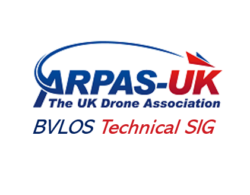

ARPAS-UK is thrilled to announce the launch of a new survey aimed at its members and the wider drone industry. This is your chance to provide valuable feedback on ARPAS-UK membership and help shape the future of the trade association.
Why Participate?
Your insights are crucial in helping ARPAS-UK understand the needs and expectations of its members. By sharing your thoughts, you can influence the direction of the association and contribute to the growth and development of the UK drone industry.
How to Participate & Make Your Voice Heard!
The survey is now live and will only take a few minutes to complete.
19 September 2024

Join us as we discuss Just Culture in UAS. This webinar is part of ARPAS-UK’s commitment to professionalising the drone industry.
In this webinar, we explore how the principles of Just Culture, widely adopted in the aviation industry, can be effectively applied to the rapidly growing Unmanned Aerial Systems (UAS) sector.
Drawing on over 30 years of experience in aviation, including 27 years as an airline pilot and leader, we will discuss how fostering a culture of accountability and learning, rather than blame, can improve safety, operational efficiency, and incident management in UAS operations. Whether you’re a UAS operator, manager, or safety professional, this session will provide valuable insights into building a resilient and safety-focused organisational culture.
About the Speaker:

David Thurston Director ARPAS, A320 Captain, UAS Operator Carrot Drone Services
With 30 years of experience in the aviation industry, including 27 years as an airline pilot, I have extensive expertise in airline operations and management. My career highlights include promoting a ‘Just Culture’ within the industry and managing pilots involved in operational incidents. I also run a successful Unmanned Aerial Systems (UAS) business, specialising in inspections and mapping services.
View other ARPAS-UK webinars/cpds.

In this webinar where we will look at proactive vs reactive asset management, the key learning points are as follows:
Speaker Bio:

David Holmes, Director at InView Assets
With a Geography and GIS background David is able to offer technical solutions to complex surveys and other digital scanning challenges. Has experience of working across a range of organisations including FTSE 100 companies and large charitable organisations. David is also a Fellow of the Royal Geographical Society and makes regular contributions to the Societies outreach programme
Hillside House
Langley Marsh
Wiveliscombe
Taunton
TA4 2UJ
Tel: 0333 7722 816
Email: [email protected]
Further webinars can be seen here: www.arpas.uk/cpd

The Institution of Mechanical Engineers (IMechE) UAS Challenge is an annual competition that brings together teams from universities around the world to design, build, and fly an unmanned aerial system (UAS). The challenge aims to encourage innovation and practical engineering skills among students.
The mission: ”A natural disaster has occurred with a large, populated area devasted. Several thousand people are cut-off, without power, fresh running water, food or medicines. In built-up
areas buildings have come down and rubble is hampering efforts to deliver emergency supplies. Time is critical. A UAS supply mission is launched from the Rescue Centre some distance away at the end of the current logistics trail. The UAS operate automatically, launching, transiting rapidly, navigating via pre-planned waypoints in a tight urban environment with rapid changes of direction, delivering aid safely and accurately to where it is most needed. They return via a different route and remain at low level to de conflict from incoming UAS and overflying crewed aircraft. This requires them to fly through the streets of the damaged communities – this will involve narrow corridors and rapid changes of direction. The UAS repeats the mission in all weather conditions until the need to drop aid subsides, sustaining a vital lifeline until a large scale rescue mission can be mounted to evacuate people from the devastated area.”
Education and Development Objectives of the Event
The Challenge has a number of education and development objectives, in particular to:
Provide an opportunity for students to learn practical aerospace engineering skills for their future careers;
Provide an opportunity for students to explore innovative airframe and systems engineering design of a complex system;
Require them to follow an industry-recognised engineering development lifecycle (design, development, review and demonstration) against a demanding mission requirement;
Provide an opportunity for students to develop and demonstrate team working, project management, manufacturing, leadership and commercial skills as well as technical competence;
Provide an opportunity to demonstrate professionalism when exposed to real life flight safety considerations and live flight environments;
Enhance employment opportunities in the sector;
Stimulate interest in the civil UAS field;
Foster inter-university collaboration in the UAS technology area, and to provide a forum for interdisciplinary research; and
Enable students to interact with knowledgeable and experienced aerospace engineers on an aerospace project, through mentoring, webinars and feedback throughout the project.
September 2024

It was an honour to participate in a panel discussion at Quiet Drones 2024 alongside industry leaders Marion Burgess, Joe Czech, Ed Weston (CAA), Jesse Suskin (Wings Australia), and Guillaume Malaval (EASA) on drone noise considerations.
Is drone noise and noise regulation a pressing issue today? Not really.
What about in the future?
For many data capture and aerial intelligence drone operations, noise may not be a significant concern either. Drone noise varies, if I am honest I regularly find their noise signature … annoying, however only the crew members and clients’ staff are typically nearby.
However, when we consider operations at scale in busy, populated areas—such as drone deliveries or urban transport where people are exposed to the noise regularly, perhaps even daily—noise becomes a different story. In these scenarios, being “quieter by design” will likely be a crucial success factor for market leaders. It won’t just be about meeting regulatory standards; it will be about developing a standout product that gains widespread acceptance and market traction.
ALS

Thank you for helping us collect data on your experience over the last 12 months in terms of obtaining permissions to fly in a FRZ, or to take-off and land from private land. Primarily: did you get permission? Was it free and if not how much was it? How efficient was the process? Have you noticed an evolution over time?
The data will be processed anonymously, and findings will be bundled together as community responses.
Please respond to our survey by clicking HERE.

Source: written exchange with CAA representative, July 2024
The logbook template provided in CAP2606 A is optional as long as operators continue to fulfil their obligations as per UK Reg (EU) 2019/947 UAS.SPEC.050.
Q: Among the 53 entries, can you specify which information is specifically required by the regulations in the flight log? In another log or records, like the flight preparation checklists, as part of the Operator’s obligation of record keeping? or is optional/not specifically required by the regulation?
Many of the 53 entries will be duplicated flight on flight, with a far smaller amount requiring specific entries. The information required will vary from Operator to Operator and flight to flight, hence, very difficult to provide further clarification.
Q: Many operators now use alternative digital means to capture flight data and records, such as Dronedesk, or Flight Reader, AirData, or Screencastomatic – much less time consuming than an excel sheet and in the end more transparent. Can you confirm these will be acceptable as a Means of Compliance?
The CAA teams are not currently able to integrate with other digital systems. However, they are aware that many will permit the export of data into a format that is currently acceptable for the CAA.
Did you read as well our article about CAP2606, the Operations manual template? Click here to read it.

Six projects have been selected for trials under a new UK Civil Aviation Authority scheme that will test drone use in deliveries, inspections of infrastructure, emergency services and flights to remote locations.
The regulator has chosen the trials to take place that will help safely integrate drones flying beyond visual line of sight (BVLOS) of their operator into UK airspace, helping to make this vital extension to drone flying an everyday reality.
BVLOS flights will be carried out at distances beyond the flyer’s ability to see the drone. These flights use advanced technologies for navigation, control and to detect other aircraft.
The UK Civil Aviation Authority has selected the projects, including:
The trials will gather key safety data, such as how drones detect and avoid other aircraft, the electronic signals they can send to be able to be visible to other airspace users and air traffic control.
This will support the regulator’s ongoing development of policy and regulations so that drone flights can be fully integrated with other airspace users.
Sophie O’Sullivan, Director of Future of Flight at the UK Civil Aviation Authority, said:
“These innovative trials mark a significant step forward in integrating drones safely into UK airspace. By supporting projects ranging from consumer deliveries to critical infrastructure inspections, we are gathering essential data to shape future policies and regulations.
“Our goal is to make drone operations beyond visual line of sight a safe and everyday reality, contributing to the modernisation of UK airspace and the incorporation of new technology into our skies.”
The UK Civil Aviation Authority invited organisations to bid to participate in an innovation sandbox to validate and test their concepts, supporting the development of BVLOS capabilities.
Innovation sandboxes are controlled environments where organisations can test and further develop their new technology against the regulatory framework, helping applicants maximise the readiness of their innovation, and also help the UK Civil Aviation Authority better evolve regulations to better support both innovators and existing users.
The BVLOS sandbox is part of a collaboration with UK Research and Innovation (UKRI) that is supporting the creation of the aviation ecosystem needed to accelerate the introduction of advanced air mobility (AAM), drones, and electric sub-regional aircraft in the UK.
Simon Masters, Future Flight Challenge Deputy Director at UK Research and Innovation, said:
“The UKRI Future Flight challenge team are excited to be working in partnership with the UK Civil Aviation Authority, working together to accelerate the introduction of drone operations in the UK.
“These have the potential to transform how we deliver goods and provide services, particularly in less well-connected regions. These new sandbox projects are a great step towards realising these ambitions.”
The new trials will also help develop plans for how drones can be safely integrated with other airspace users, as part of the regulator’s wider Airspace Modernisation Strategy.
The projects included in the trial are:
Amazon Prime Air
Airspection
NPAS
NATS
Project SATE
Project Lifeline